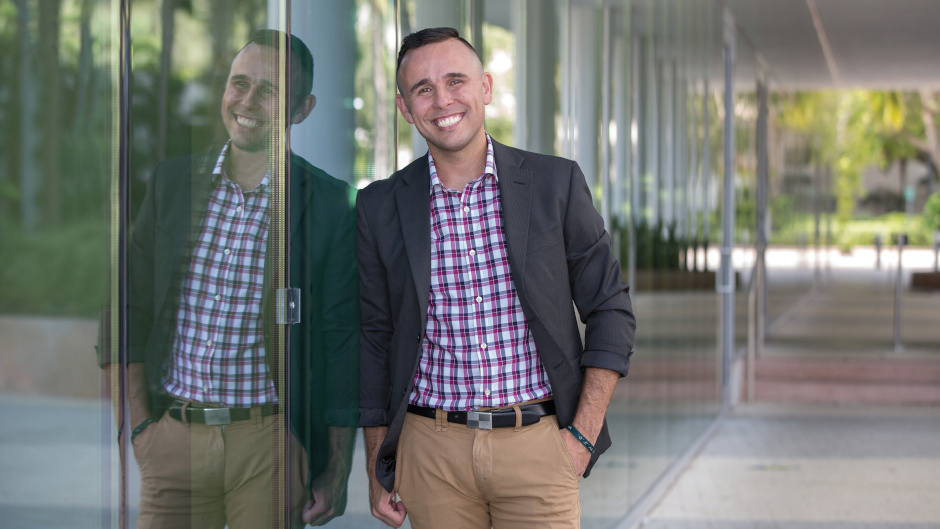Angel Sanchez may be the poster child for the overextended 2L. Sanchez juggles a full load of classes, works in Miami Law's Innocence Clinic, advocates against felony disenfranchisement, and teaches persuasive legal writing at the Dade Correctional Institution through HOPE. In between his Miami Law life, he can be found doing media interviews, documentary film shoots, and speaking engagements—most recently at Harvard Law School.
Combating felony disenfranchisement is the issue very close to Sanchez’s heart. The native Miamian felt disproportional pressure last fall as Amendment 4 was on Florida’s November ballot. The successful passage restored voting eligibility to 1.4 million people with past felony convictions who have fully paid their debt to society.
He is one of the disenfranchised. In 1999, Sanchez, then 16 years old, was sentenced to serve 30 years in prison for gang-related attempted murders.
The road from prison to homelessness to college student to law student was rife with nearly overwhelming hardships, but his biggest battle may be yet to come. Sanchez, who is in the top 5% of his class, may face challenges to being admitted to the Florida Bar because aspiring lawyers with past convictions must have their civil rights fully restored to be considered for bar admission.
“Ever since I earned my GED behind bars, I realized that education was my sanctuary and gave me validation in a world where I was told that I was not worth anything,” Sanchez says. “I believe that if I work hard, get an education, and look for ways to help others, things will work out one way or another. That’s what keeps me pushing forward.”
Sanchez has filled his path with strong grit and good works: he took four buses daily from the Salvation Army where he was living to his work and college classes in Orlando. At the University of Central Florida, he was named one of the nation's top moot court competitors while at the same time helping to collect over 300 books for the Orange County Jail. He graduated summa cum laude with a dual degree in political science and legal studies.
Born in Miami's Little Havana neighborhood, Sanchez’s mother struggled with drug addiction. He was raised by a father, an immigrant from Cuba who spoke little English and could barely read or write, who emphasized education, a lesson that Sanchez was loathed to learn. Not yet a teenager, the small-framed Sanchez turned to a local gang, affording him a sense of protection and belonging. Over time, his rap sheet grew.
"Like a lot of kids, peers have more sway than your parents," Sanchez says. "And I was in a neighborhood where it was so easy to make bad choices because it was all around you. Don't get me wrong. I had a choice, and I made the wrong one."
He was tried as an adult on the attempted murder, an ill-advised decision that would yield surprisingly fortuitous results. The prison law library proved a respite for the inmate with a ninth-grade education; earning a GED (the diploma slipped unceremoniously through a slit in his cell in solitary) and spent hundreds of hours teaching himself enough law to successfully win an appeal, reducing his sentence to 15 years, and release after 12 in custody.
Free but homeless, Sanchez enrolled in Valencia Community College where he excelled and was selected for a Jack Kent Cooke Foundation Scholarship to transfer to the University of Central Florida. However, because of his probation, he was unable to accept it. A judge, hearing of his plight, terminated his supervision so he could use the scholarship; it now helps Sanchez attend Miami Law on a full ride.
"In my head, I asked God for just one chance, and I made a commitment to myself that I would take whatever opportunity came my way and make the most of it," says Sanchez. "But one small window opened another, then another, then a door. I am going to keep working hard and running through every door I find."

